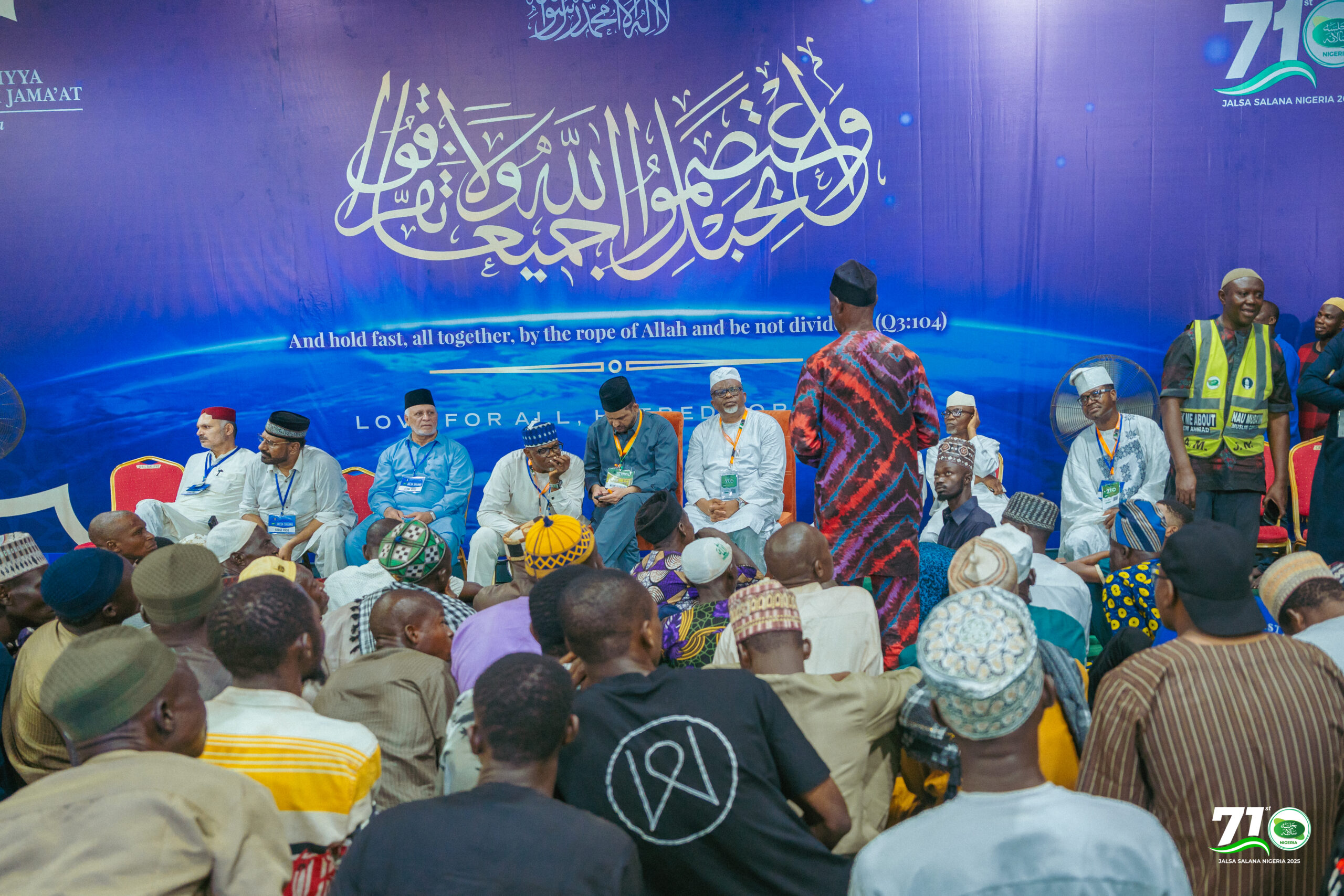By Amatussalam Akinyemi Oyinlola
Introduction
The term Jalsa is derived from the Arabic word “جلسة,” meaning a “gathering” or “sitting.” It signifies a sacred assembly where believers come together to foster unity, piety, devotion, and brotherhood. Instituted by the Promised Messiah, Hazrat Mirza Ghulam Ahmad (as), the Jalsa serves as a spiritual congregation aimed at the moral, spiritual, and religious betterment of its participants. Central to the success of this gathering is obedience, which acts as the cornerstone for discipline, harmony, and spiritual upliftment.
Obedience, as defined in Islam, is the complete submission to the commands of Allah, His Messenger (peace and blessings of Allah be upon him), and legitimate authorities. This principle is emphasized in Surah An-Nisa (4:60):
يا أيها الذين آمنوا اطيع الله و اطيع الرسول و اؤل الأمر منكم.
“O you who believe! Obey Allah and obey His Messenger and those who are in authority among you.”
This verse lays the foundation for three essential aspects of obedience: obedience to Allah, His Messenger, and those in authority. Together, these principles ensure a harmonious environment at Jalsa, allowing participants to benefit spiritually and morally.
- Obedience to Allah
Obedience to Allah is the bedrock of a believer’s faith. Every action must align with the divine commandments outlined in the Holy Qur’an. Submission to Allah during Jalsa ensures that participants approach the event with sincerity, humility, and a focus on self-reformation.
The Qur’an highlights this attitude in Surah Al-Baqarah (2:287):
وقالوا سمعنا و اطعنا غفرآنك ربنا و اليك المصير
“We hear, and we obey. Grant us Thy forgiveness, our Lord, and to Thee is the returning.”
Participants who embody this spirit of obedience create an atmosphere of peace and mutual respect, enabling the event to fulfil its spiritual objectives. This submission also reinforces the importance of adhering to the event’s schedule, observing prayers, and maintaining the sanctity of the gathering.
- Obedience to the Holy Prophet (saw)
The Holy Prophet Muhammad (peace and blessings of Allah be upon him) is the practical and perfect exemplar of how to implement Allah’s commandments. His life and teachings provide guidance for creating unity and harmony in the Muslim community.
The Prophet (saw) emphasized obedience to maintain communal discipline and spiritual growth. He stated:
“Whoever obeys me, obeys Allah; and whoever disobeys me, disobeys Allah. And whoever obeys the leader I appoint, obeys me; and whoever disobeys him, disobeys me.” (Sahih Bukhari)
At Jalsa, adherence to the teachings of the Prophet (saw) prevents misunderstandings, disputes, and individualistic interpretations, fostering a unified environment. His emphasis on collective worship, mutual respect, and humility becomes a guiding framework for all participants.
- Obedience to Those in Authority
The Qur’an also emphasizes the importance of obeying legitimate leaders and authorities who maintain order and provide guidance. These leaders may include the Khalifah, Islamic scholars, or event organizers. In the context of Jalsa, their instructions ensure the event runs smoothly and achieves its objectives.
The Promised Messiah (as) highlighted the significance of obedience in his Malfuzat:
“A community cannot prosper without discipline and obedience to its leaders. Unity is born from following one leader, and blessings descend upon a Jama’at that follows this principle.“
During Jalsa, volunteers and organizers manage various responsibilities such as registration, seating, dining arrangements, and safety protocols. Ignoring their instructions not only disrupts the event but also undermines the efforts of those striving to create a conducive environment for spiritual growth.
In addition, obedience to the Khalifah ensures that the event remains spiritually uplifting. The Khalifah’s guidance shapes the purpose of the Jalsa and strengthens the participants’ connection with their faith.
The Role of Obedience in Ensuring Discipline, Order, and Harmony
- Discipline and Coordination:
Jalsa involves meticulous planning and coordination. Participants are expected to follow prescribed schedules, observe punctuality, respect seating arrangements, adhere to safety protocols, and honour mealtime guidelines. Volunteers play a crucial role in ensuring these arrangements are upheld. Disobedience can lead to disorder, affecting the experience of others.
For instance, organizers managing traffic, registration, and prayer arrangements depend on the cooperation of participants. Without collective obedience, their efforts would be in vain, and the sanctity of the event would be compromised.
- Unity and Spiritual Focus:
Obedience to the Khalifah fosters unity and a shared spiritual focus among participants. The Khalifah’s instructions serve as a beacon of guidance, instilling a sense of purpose and devotion in the congregation. By adhering to his guidance, participants collectively achieve the spiritual objectives of the Jalsa.
- Prevention of Conflict:
Obedience helps prevent misunderstandings and disputes. By following a unified framework of instructions, participants avoid unnecessary conflicts, ensuring the event remains peaceful and spiritually uplifting.
Examples from Islamic Teachings on Obedience
Example of Hazrat Abu Bakr (ra):
When the Holy Prophet (sa) passed away, Hazrat Abu Bakr (ra) was chosen as the first Khalifah. His leadership exemplified obedience, as the Companions rallied behind him despite their grief. This unity preserved the community’s strength and faith.
The incident of the Battle of Uhud:
During the Battle of Uhud, the importance of obedience became evident when a group of archers disobeyed the Prophet’s (sa) instructions, leading to a temporary setback. This event underscores the critical need for following leadership to maintain discipline and achieve success.
Hazrat Khalifatul Masih V (aba) in his Friday sermon delivered on December 5th 2014, he said
“The responsibility on Ahmadis is very great, we have to demonstrate an example of ‘…obey Allah, and obey His Messenger and those who are in authority over you…’ which will draw the world to us. This is the only way we can take the world to the footsteps of God and His Messenger and can guide the world. This is the way we can end disorder in the world. We have the commandments of the Holy Qur’an which are worthy of being practiced and worthy of being obeyed. We have the blessed model of the Prophet, and it is our obligation to obey it. And we also have the spiritual system of ‘ulul amr’ اولی الامر (who are in authority) over us which constantly draws our attention to the commandments of God and His Messenger. There is no reason we cannot generate a clear distinction between us and the others. May God enable all of us to do so and may we always fulfil the expectations of the Promised Messiah (on whom be peace)!”
Conclusion
Obedience is a foundational pillar for the success and blessings of Jalsa. It ensures discipline, harmony, and unity among participants, enabling them to benefit from the event’s spiritual and moral objectives. By obeying Allah, following the teachings of the Holy Prophet (sa), and adhering to the guidance of legitimate authorities, believers create an environment that embodies the principles of devotion, humility, and brotherhood.
The Promised Messiah (as) aptly said:
“Obedience is the essence of faith. Without it, neither unity can be achieved, nor blessings attained.“
May Allah grant all participants the ability to practice true obedience and reap the spiritual rewards of Jalsa. Ameen.





